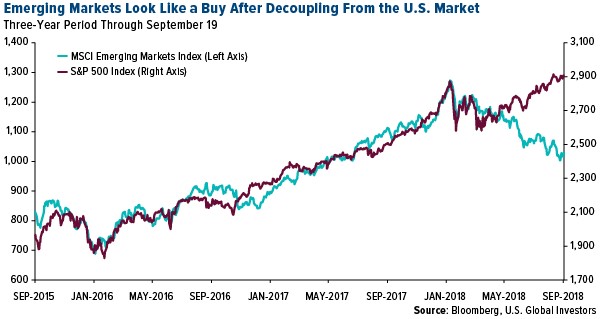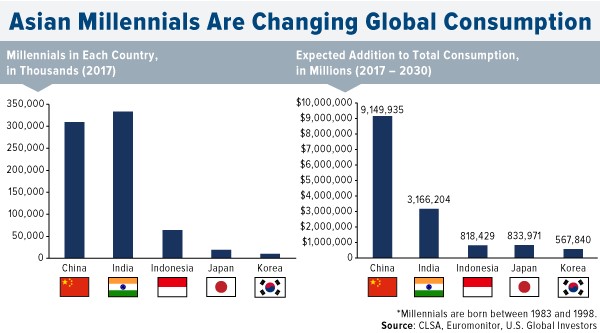Emerging markets continue to decouple from the U.S. market, making them look attractive as a value play—particularly distressed Chinese equities. Below I’ll share with you two big reasons why I think China is well-positioned to outperform over the long term.
So far this year, the MSCI Emerging Markets Index has given up about 10 percent, mostly on currency weakness and global trade fears. The S&P 500 Index, meanwhile, has advanced roughly 9 percent as a flood of passive index buying pushes valuations up and companies buy back their own stock at a record pace.

(Click to enlarge)
S&P Dow Jones Indices reported this week that buybacks in the second quarter increased almost 60 percent from the same three months a year ago to a record $190.6 billion. For the 12 months ended June 30, S&P 500 companies, flush with cash thanks to corporate tax reform, spent an unprecedented $645.8 billion shrinking their float. In the first half of 2018, in fact, companies spent more on buybacks than they did on capital expenditures.
As I told CNBC recently, this, combined with fewer stocks available for fundamental investing, could contribute toward a massive selloff when it comes time for multibillion-dollar index funds to rebalance at year’s end.
But let’s get back to emerging markets.
The Selloff Is Overdone, According to Experts
Again, China in particular looks like a buying opportunity with stocks down near a four-year low. Speaking with CNBC last week, chief executive of J.P. Morgan Chase’s China business, Mark Leung, said that the emerging market selloff is largely overdone. “If you look at the positioning and also the fundamentals side, we think there are reasons to start going into emerging markets for the medium and long term,” Leung said, adding, “China is a big piece.”
This view was echoed by Catherine Cai, chairman of UBS’s Greater China investment banking arm, who told CNBC that she believes “among all the emerging markets, China’s still representing the most attractive market.”
The U.S. just imposed tariffs on as much as $200 billion worth of Chinese imports, which will have the effect of raising consumer prices. Among the retailers and brands that have already announced they will be passing costs on to consumers are Walmart, General Motors, Toyota, Coca-Cola and MillerCoors. China plans to retaliate with tariffs of its own on $60 billion in U.S. exports.
Related: Gold Exodus To Reverse
Despite this, the tariffs’ impact on the Chinese economy will be “very small,” Cai said, as the country’s government is now “prepared” to handle the additional pressure.
The Power of 600 Million Millennials
The two reasons I find China so compelling right now are 1) promising demographics, and 2) financial reform.
As for the first reason, there’s really no arguing against the sheer math of Asia’s exploding population. You’ve heard the expression “There is strength in numbers,” and nowhere is that more apparent than in China and India, affectionately known as “Chindia,” where 40 percent of all humans live.
But there’s more. According to a recent report from CLSA, the entire continent of Asia is now home to nearly one billion millennials, or people aged 20 to 34. China and India alone contribute more than 600 million millennials, the youngest of whom will “start to hit their ‘peak’ earning capacity” over the next 10 years, says CLSA.

(Click to enlarge)
“Millennials are more affluent, better educated with difference perspectives and priorities than their parents’ generation, which tends to sacrifice present consumption for the future,” CLSA writes. “Millennials care less about saving.”
This translates into not only the largest consumer class the world has ever seen, but also the most eager to spend their money on goods and services their parents and grandparents could never have imagined.
Consumption, in fact, now accounts for nearly 80 percent of China’s gross domestic product (GDP) growth, helping the country become less dependent on capital input and foreign trade.
China’s Capital Markets Continue to Mature
As for my second reason, financial reform, Premier Li Keqiang recently pledged to give equal treatment to foreign investors in capital markets, all in the name of bolstering confidence among investors who may have been rattled lately by the U.S.-China trade dispute.
“The pool is full of water,” Li said, “and the challenge is to unblock the channels.”
China A-shares, those traded in the Shanghai and Shenzhen stock exchanges, were once available only to Chinese citizens living on the mainland. But as a sign of the financial market’s maturity, last week marked the first time that foreign investors living in mainland China, as well as employees of listed Chinese firms living overseas, could freely trade A-shares.
Many A-shares have already been added to indexes provided by MSCI, and FTSE Russell said it will decide soon whether to do the same.
As we’ve seen in the U.S. market and elsewhere, a stock’s inclusion in a major index has meant, for better or worse, that it automatically gets an infusion of investors’ money, regardless of fundamentals.
That Premier Li plans to open China’s market up even further is exciting, and makes its investment case even stronger.
By Frank Holmes
More Top Reads From Safehaven.com:
















